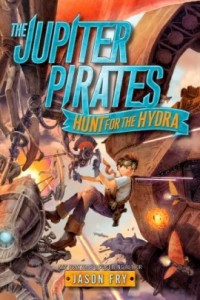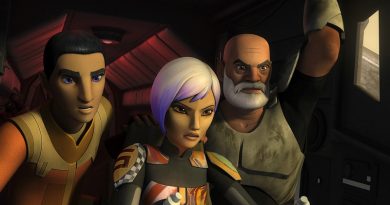Jason Fry Shakes Up History And Storytelling
 Last week Jay Shah of Star Wars commentary site Eleven-ThirtyEight.com shared his thoughts in his piece “What Star Wars Can Learn From The Jupiter Pirates.” The new series’ opening novel by Star Wars author Jason Fry, titled The Jupiter Pirates: The Hunt for the Hydra, hit bookstores in the last week of 2013. As Shah notes, it provides plenty of lessons for future Star Wars storytelling. The middle grade novel is reminiscent of the Young Jedi Knights stories with the twins Tycho and Yana and an older brother Carlo. Unlike the Solo twins, who often told the reader about how their shared birth affected their feelings and choices, the Hashoone twins show the reader they operate well as a team. For many more reasons Fry’s storytelling is more sophisticated than the Young Jedi Knights books, but equally as important it’s enjoyable too.
Last week Jay Shah of Star Wars commentary site Eleven-ThirtyEight.com shared his thoughts in his piece “What Star Wars Can Learn From The Jupiter Pirates.” The new series’ opening novel by Star Wars author Jason Fry, titled The Jupiter Pirates: The Hunt for the Hydra, hit bookstores in the last week of 2013. As Shah notes, it provides plenty of lessons for future Star Wars storytelling. The middle grade novel is reminiscent of the Young Jedi Knights stories with the twins Tycho and Yana and an older brother Carlo. Unlike the Solo twins, who often told the reader about how their shared birth affected their feelings and choices, the Hashoone twins show the reader they operate well as a team. For many more reasons Fry’s storytelling is more sophisticated than the Young Jedi Knights books, but equally as important it’s enjoyable too.
Shah states that The Jupiter Pirates handles the youth audience well. My gut instinct is that will be the case, although at times I wondered if the show-not-tell was almost too sophisticated for the younger readers. I have passed my copy along to my tweeny nephews to get their opinion. As Shah says in his piece:
Where The Hunt for the Hydra succeeds admirably is how it deploys female characters. The captain of the pirate ship that serves as the main story setting is a female: Tycho’s mother, Diocletia Hashoone. She’s the captain, and basically the head of the family too. The most important part about this, and why I think it is particularly important for a young audience (but really, everyone) is that it isn’t once commented on as unusual. It’s not an issue: mom’s in charge. Her husband doesn’t make a fuss, her father doesn’t make a fuss, and the only person who could have ever had a claim to the captain’s seat is her sister: but Diocletia earned it by merit (how one earns a captaincy is a running theme in the story), and that’s that. Tycho also has a twin sister – Yana – who seems to have a decided disdain for dresses, and there’s a scene where a particularly snooty character remarks that it’s not very ladylike of her to be a privateer but then that character doesn’t think anyone ought to be a privateer, so it’s not a gendered put down. Yana wants to be who she is, and nobody really has an issue with it.
Shah’s article isn’t shameless about telling Star Wars what he would like to see in content or content creators. Staffed by veteran Star Wars fans, Eleven-ThirtyEight has taken a proactive stance on the future of the franchise. This is important with some of the most pivotal stories in the works right now: fans need to keep their expectations very much at the fore of the storytellers’ and Powers That Be’s minds, as opposed to ending up with only the option of being reactive to products that fail our hopes and desires.
In last week’s Five Resolutions for Star Wars post, I encouraged the franchise to still do better in several areas, including fandom engagement and passionate storytelling. Fry exemplifies an author who actually understands fan passion; his personal blog work as a Mets fan showing he understands how fandom operates. His previous non-fiction work books like The Essential Atlas and The Essential Guide to Warfare highlight how he has engaged the fandom to create unique bodies of work. Notably, Warfare created a dense, fulfilling addition to the Expanded Universe while still managing to respect the notion that Star Wars is best served as a something viewed as history that happen a long time ago, in a galaxy far, far away. Better yet, Fry updates his author blog often in a way that defines his brand, a tool that is underutilized by many Star Wars authors. With so many creators out stomping for their personal brand and the brands that employee them, authors are finally having to behave like professionals in any other business and interact with the paying customer. Much like Dave Filoni, Fry is quite comfortable explaining the how’s and why’s of his storytelling choices. In his blogging, Fry exhibits that he knows what it means to be a fan, that he is passionate, and that he possesses an understanding of effective storytelling, writing, and how being an author in this day and age is as just as much about establishing a brand and voice as it is storytelling and writing.
Finally, while Jason Fry doesn’t fit my encouragement of More Female Storytellers, his work in The Jupiter Pirates proves that his inclination is to not let storytelling precedent, sexist double standards and tropes slip into his story. While adding more women to the storytelling mix for any franchise will help alleviate these problems that hinder better portrayals for female characters, it’s not a hard-and-fast fix. Women are perfectly capable of perpetuating tropes they have absorbed in the stories they tell and the stories they allow to be told under their watch. It’s unclear whether Fry thinks hard about it or if it’s natural, but he tells a story that feels like it is steeped in history, yet it is not lazy about buying into historically sexist standards such as stereotypical gender roles. When I closed the first book of The Jupiter Pirates, I felt like my nieces and nephews would all gain from the story being told. If I had room for more resolutions for Star Wars, one of them would have been to keep or hire male storytellers that have already proven they can move past storytelling precedent that undermines women, while losing the storytellers who have proven they can’t.
Tricia Barr took her understanding of brand management and marketing, mixed it with a love of genre storytelling, and added a dash of social media flare to create FANgirl Blog, where she discusses Star Wars, fandom, and strong female characters. She also writes about Star Wars for Random House’s science fiction and fantasy blog Suvudu.com and Star Wars Insider magazine and is a contributor for Her Universe’s Year of the Fangirl. Her FANgirl opinions can be heard on the podcasts Assembly of Geeks and RebelForce Radio Presents Fangirls Going Rogue.
Tricia has completed her first novel, Wynde – a military science fiction with a fantastical twist that features heroines Vespa and Gemini. For excerpts and tales of her adventures in creating a fictional universe, hop over to TriciaBarr.com.
For updates on all things FANgirl follow @FANgirlcantina on Twitter or like FANgirl Zone on Facebook. At times she tries the Tumblr.
- Hyperspace Theories: SKELETON CREW Ahoy! - December 29, 2024
- Hyperspace Theories: WICKED Part I Rises to the Moment - December 6, 2024
- Columbia’s Vader™ Collection Launches Dec 5 - November 27, 2024










